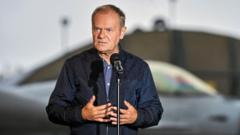Will Ireland Pull Out of Eurovision Over Israel's Participation?

Published: 2025-09-11 12:06:02 | Category: technology
In a bold move, RTÉ, Ireland's national broadcaster, has declared it will not participate in the 2026 Eurovision Song Contest if Israel is allowed to compete. This decision stems from the broadcaster's concerns regarding ongoing violence and humanitarian crises in Gaza, which they deem unacceptable. RTÉ aims to reassess its position once the European Broadcasting Union (EBU) finalises its decision regarding Israel's participation.
Last updated: 27 October 2023 (BST)
RTÉ's Position on Eurovision: A Closer Look
The Eurovision Song Contest, celebrated for its music and cultural exchange, has often found itself at the intersection of politics. RTÉ's announcement is a testament to the increasing influence of current events on cultural platforms. The broadcaster's statement reflects a growing sentiment among some nations and organisations, calling for accountability and ethical considerations in international events.
Key Takeaways
- RTÉ will withdraw from Eurovision 2026 if Israel participates.
- The decision is linked to ongoing humanitarian issues in Gaza.
- Final participation will depend on the EBU's official ruling.
- This marks a significant intersection of culture and politics in international events.
- RTÉ's stance may influence other broadcasters' decisions regarding participation.
The Context Behind RTÉ's Decision
RTÉ's decision is grounded in the escalating humanitarian crisis in Gaza, which has seen a significant loss of life and widespread devastation. As global awareness of these issues grows, cultural institutions are increasingly pressured to align their values with their participation in international events.
The broadcaster's statement indicates a moral stance, reflecting a broader movement among media organisations to advocate for human rights. The implications of this decision may resonate beyond Ireland, potentially influencing other broadcasters' participation in the contest.
What This Means for Eurovision 2026
The Eurovision Song Contest has historically been a platform for unity and diversity. However, RTÉ's announcement raises questions about the future of the competition in the context of geopolitical tensions. If other broadcasters follow suit, the EBU will face significant pressure to reconsider the inclusion of countries embroiled in conflict.
As the EBU deliberates on the matter, the outcome will not only affect the contest but could also redefine the role of such cultural events in political discourse.
Public and Industry Reactions
The reaction to RTÉ's announcement has been mixed. Supporters laud the broadcaster for taking a stand against perceived injustices, while critics argue that art and culture should remain separate from political disputes. This division highlights a growing tension within the artistic community, as creators and institutions grapple with their responsibilities in the face of global issues.
Moreover, the Eurovision Song Contest itself has seen various nations withdraw or threaten to withdraw over political grievances in the past. This could potentially set a precedent, leading to a domino effect among other participating countries.
Eurovision's Historical Context with Political Tensions
Eurovision has a rich history of intertwining music and politics. From boycotts to political statements during performances, the contest has often been a reflection of the sociopolitical climate of its time. RTÉ's stance echoes past moments when nations have used the platform to express dissent or solidarity with international causes.
For instance, in the 1970s, several countries withdrew from the contest due to political disagreements, and more recently, the 2022 contest saw Ukraine's entry receive overwhelming support amid its ongoing conflict with Russia. These instances illustrate how Eurovision serves not just as a music competition but also as a stage for global political expression.
Next Steps for RTÉ and Eurovision
As RTÉ awaits the EBU's decision on Israel's participation, the broadcaster has indicated it will reassess its options based on the outcome. This nuanced approach illustrates a willingness to adapt while firmly standing by its principles. The EBU's response will be critical in shaping the direction of the 2026 contest and may influence how broadcasters engage with the event in the future.
In the coming months, as discussions unfold, it will be essential for stakeholders to consider the implications of their decisions on international relations and cultural representation. The evolving nature of these conversations could lead to significant changes in how events like Eurovision operate in a politically charged environment.
Conclusion: A Cultural Crossroads
RTÉ's declaration not to participate in Eurovision 2026 if Israel competes is more than a mere statement; it is a reflection of the changing landscape of cultural participation in the face of humanitarian crises. As the EBU prepares to make its decision, the outcome will resonate beyond the contest itself, potentially influencing how nations engage in cultural diplomacy and the responsibilities that come with it. The intersection of culture and politics is increasingly complex, and this scenario exemplifies the challenges faced by artists and institutions worldwide.
As we look ahead, it remains to be seen how this situation will evolve and what it will mean for the future of international cultural events. Will other broadcasters join RTÉ in its stance, or will the show go on despite the ongoing turmoil? Only time will tell.
For now, the world watches closely as the EBU navigates this delicate situation. How should cultural events balance artistic expression with political realities? #Eurovision2026 #RTÉ #CulturalDiplomacy
FAQs
Why is RTÉ withdrawing from Eurovision 2026?
RTÉ announced it would not participate in Eurovision 2026 if Israel competes, citing the ongoing humanitarian crisis in Gaza as the reason for its decision.
What does this mean for the Eurovision Song Contest?
RTÉ's withdrawal could set a precedent for other broadcasters, potentially affecting the EBU's decisions and the future of the contest amidst political tensions.
When will the European Broadcasting Union make its decision?
The exact timeline for the EBU's decision regarding Israel's participation in Eurovision 2026 is currently unclear, but RTÉ will await this outcome before finalising its stance.
Has RTÉ taken similar actions in the past?
Yes, RTÉ has previously engaged in discussions regarding the political implications of participation in international events, reflecting a growing trend among broadcasters to align with ethical considerations.
What implications does this have for cultural events in general?
This situation highlights the increasing intersection of politics and culture, suggesting that cultural events may need to adapt to changing political landscapes and public sentiment.



